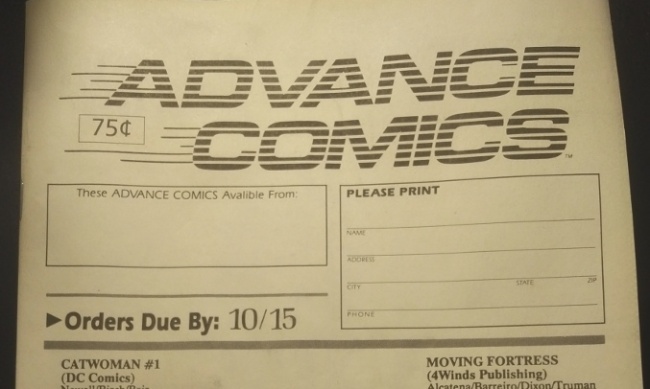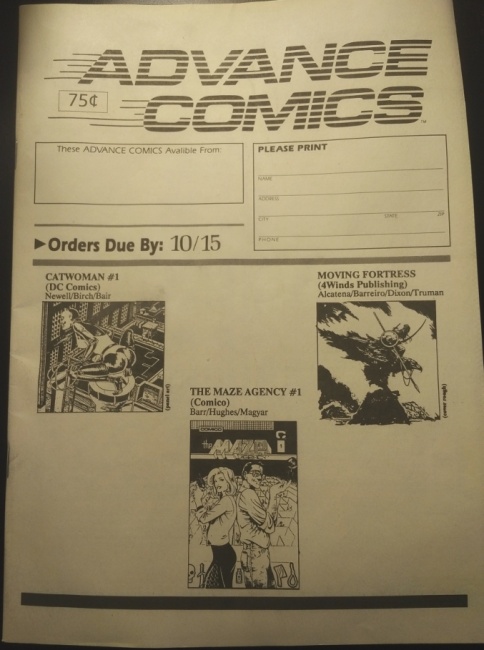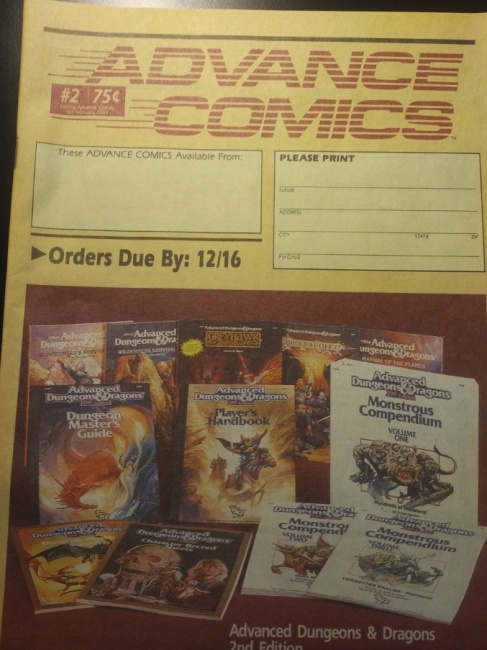In late September, 1988, Capital City Distribution released Advance Comics #1, a new kind of publication that was intended for use by consumers to place advance orders on comics, games, and other geek culture products (although we didn’t call them that then).
I came up with the idea because we were looking for a way to help retailers get a better handle on what their customers wanted before they placed their orders. There were around 1,000 products in that first issue, with over 400 comics (220 color, 185 b/w), around 75 game products, and the rest a mix of books, magazines, apparel, imports, trading cards, and other merch categories. That was a lot of products for retailers to evaluate, and a big jump from earlier that decade, when the whole thing fit on a couple of sheets of paper (see "40 Years Ago Today"). It was increasingly clear that buying that many products non-returnable was going to require new ways to assess demand in advance of ordering.
So the basic cycle was developed: Advance Comics went out at the end of September, the due date to retailers was October 15, the due date to Capital City was around a week later, and we totaled them and sent orders to publishers for December releases by around November 1.
All of the basic elements of today’s distributor-produced advance order catalogues were in place: the order cycle, consumer pricing-only in the catalogue, descriptions and sometimes images for each product, ads that featured some products more prominently, editorial content (in the case of that first issue, a bestseller chart reprinted from Internal Correspondence, the predecessor of ICv2), an order form for consumers to use with retailers, and a separate order form for retailers to use with the distributor. Advance Comics #1 carried a cover price of $.75 for its 72 b/w self-cover pages.
That first issue took advance orders for both comics and games; in fact, by the third issue (numbered Vol. 2 #2), the first color issue, the cover-featured product was a game, Advanced Dungeons & Dragons 2nd Edition, and games continued to have a prominent presence throughout.
The following year, Diamond Comic Distributors, Capital’s largest competitor, assigned Steve Bond, an employee hired when Diamond acquired Bud Plant, Inc., to create a new catalogue for Diamond on the same model as Advance Comics, and Diamond Previews was born. (Diamond eventually acquired assets of Capital City, including the Advance Comics trademark, in 1996.)
After Diamond owner Steve Geppi acquired Alliance Game Distributors in 2000, it launched Game Trade Magazine, a similar publication directed at hobby games buyers. ACD Distribution started Meeple Monthly, a similar publication.
So that brings us to today, nearly 32 years after the launch of Advance Comics and the beginning of the distributor-published advance order catalogues for consumers, and it’s time to lay them to rest. They’re an anachronism, and have been for at least a decade.
Now that the coronavirus pandemic is laying waste to carefully choreographed release schedules, monthly consumer catalogues are even more unfit for what they’re being asked to do. When publishers’ schedules are changing rapidly and needing to adapt to rapidly changing circumstances, a catalogue cycle that takes roughly three months from beginning to end (from when the publisher has to get information to the distributor to the release of the product) just can’t do the job.
The whole process should have been moved online years ago. Consumers are adept at online browsing while for more and more in the target demo, a catalogue is something they’ve rarely, if ever, seen before. A good user interface for online ordering can help consumers find the products they want more easily, and help them spend more. And just like Amazon and other online retailers, independent retailers should be able to take orders online beginning the day the product is announced and ending as close to release date as possible, especially on products on which Amazon is very competitive, like board games and graphic novels (see "Pro: World According to Griepp: Can Comic Stores?" for a discussion of that issue as it relates to graphic novels). The coronavirus era makes that flexibility for the ordering cycle even more important.
What would an online ordering system that replaces the distributor catalogues look like? Tune into my next column where I lay that out.
We’re putting these World According to Griepp coronavirus columns on the public site instead of the Pro site because of the importance of the times, but please support our Pro site with a new or ongoing subscription. The most recent was on how companies can adapt to the coronavirus era (see "World According to Griepp: Adapting to the Coronavirus Year"), and if you’re logged into your Pro account check out the discussion below the article.
Milton Griepp is the founder and CEO of ICv2, and long-time executive in the geek culture business. The opinions expressed in this column are solely those of the writer.
Click Gallery below for full-size pics of early Advance Comics issues!

And Why They Should Die in the Coronavirus Era
Posted by Milton Griepp on May 7, 2020 @ 4:13 am CT





 View Gallery: 5 Images
View Gallery: 5 Images